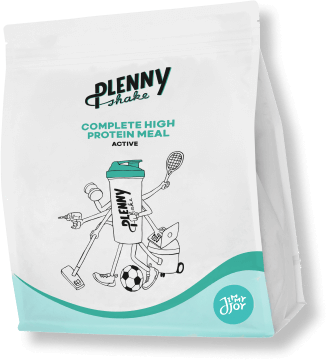Updated on April 24th, 2024

Since established in 2014, we have strived to create the healthiest meals for you through extensive scientific processes. But, Perhaps you're curious: how do we acquire the nutritional gold in the sea of ingredients and what is healthy exactly? Lucky for us, the European Food Safety Authority (EFSA) has been our north star in this quest. Back in 2006, EFSA came up with a regulation to control the claims made on food products in terms of the healthiness of the products. These claims serve as a bridge between our products and their various health benefits, all carefully backed up by scientific research.
Now, let's talk about our creations. Picture this: a nutritional solution meticulously developed with all 26 essential vitamins and minerals existing harmoniously in a bioavailable form, alongside a hearty dose of protein, healthy fats, complex carbohydrates, probiotics to boost your gut health and a notable source of fibre, our products are a reflection of our dedication to crafting nutritious options. And the best part? We've counted – painstakingly, mind you – a grand total of 175 health benefits bestowed upon you by Jimmy Joy.
Within the forthcoming section, you'll encounter a comprehensive compilation of these health benefits, covering a spectrum of bodily functions.
- From optimizing metabolism, digestion, absorption, and synthesis to nurturing the intricacies of the nervous system, cells, thyroid, and blood, each benefit contributes to overall wellness.
- Enhance brain function, fortify mental health, and bolster the immune system while regulating hormones and enhancing fertility and reproduction.
- Bid farewell to fatigue and welcome robust bone, muscle, and connective tissue health.
- Safeguard mucous membranes, dental hygiene, eye, skin, and hair health, all while promoting optimal liver function.
This exhaustive list encapsulates the multifaceted dimensions of human physiology, underscoring the importance of holistic well-being.
You can take your time to explore the benefits or jump straight into the specific nutrient that interests you—it's up to you.
Minerals
- Potassium
- Chloride
- Calcium
- Phosphorus
- Magnesium
- Iron
- Zinc
- Copper
- Manganese
- Selenium
- Chromium
- Molybdenum
- Iodine
Vitamins
- Vitamin A
- Vitamin D
- Vitamin E
- Vitamin K
- Vitamin C
- Thiamine
- Riboflavin
- Niacin
- Vitamin B6
- Folate / Folic acid
- Vitamin B12
- Biotin
- Pantothenic acid
- Choline
Macronutrients and Additives
Minerals
Potassium
#1 Contributes to the normal functioning of the nervous system
#2 Contributes to normal muscle function
#3 Contributes to the maintenance of normal blood pressure
Argumentation: These benefits are achievable when a product contains 300 mg of Potassium per 100g. In the case of our meals, each portion contains 400 mg of Potassium.
Chloride
#4 Contributes to normal digestion by production of hydrochloric acid in the stomach
Argumentation: These benefits are achievable when a product contains 120 mg of chloride per 100g. In the case of our meals, each portion contains 279 mg of chloride.
Calcium
#5 Contributes to normal energy-yielding metabolism
#6 Contributes to the normal function of digestive enzymes
#7 Contributes to normal blood clotting
#8 Contributes to normal muscle function
#9 Contributes to normal neurotransmission
#10 It has a role in the process of cell division and specialisation
#11 It is needed for the maintenance of normal bones
#12 It is needed for the maintenance of normal teeth
Argumentation: These benefits are achievable when a product contains 120 mg of calcium per 100g. In the case of our meals, each portion contains 185 mg of calcium.
Phosphorus
#13 Contributes to normal energy-yielding metabolism
#14 Contributes to the normal function of cell membranes
#15 Contributes to the maintenance of normal bones
#16 Contributes to the maintenance of normal teeth
Argumentation: These benefits are achievable when a product contains 105 mg of phosphorus per 100g. In the case of our meals, each portion contains 140 mg of phosphorus.
Magnesium
#17 Contributes to normal energy-yielding metabolism
#18 Contributes to normal protein synthesis
#19 Contributes to a reduction of tiredness and fatigue
#20 Contributes to electrolyte balance
#21 Contributes to the normal functioning of the nervous system
#22 Contributes to normal muscle function
#23 Contributes to normal psychological function
#24 Contributes to the maintenance of normal bones
#25 Contributes to the maintenance of normal teeth
#26 It has a role in the process of cell division
Argumentation: These benefits are achievable when a product contains 56.25 mg of magnesium per 100g. In the case of our meals, each portion contains 75 mg of magnesium.
Iron
#27 Contributes to normal energy-yielding metabolism
#28 Contributes to normal cognitive function
#29 Contributes to the normal formation of red blood cells and haemoglobin
#30 Contributes to normal oxygen transport in the body
#31 It has a role in the process of cell division
#32 Contributes to the normal function of the immune system
#33 Contributes to the reduction of tiredness and fatigue
Argumentation: These benefits are achievable when a product contains 2.1 mg of iron per 100g. In the case of our meals, each portion contains 3.2 mg of iron.
Zinc
#34 Contributes to normal macronutrient metabolism
#35 Contributes to normal metabolism of fatty acids
#36 Contributes to normal carbohydrate metabolism
#37 Contributes to normal metabolism of Vitamin A
#38 Contributes to normal acid-base metabolism
#39 Contributes to normal protein synthesis
#40 Contributes to the protection of cells from oxidative stress
#41 It has a role in the process of cell division
#42 Contributes to normal DNA synthesis
#43 Contributes to normal cognitive function
#44 Contributes to normal fertility and reproduction
#45 Contributes to the maintenance of normal bones
#46 Contributes to the maintenance of normal hair
#47 Contributes to the maintenance of normal nails
#48 Contributes to the maintenance of normal skin
#49 Contributes to the maintenance of normal testosterone levels in the blood
#50 Contributes to the maintenance of normal vision
#51 Contributes to the normal function of the immune system
Argumentation: These benefits are achievable when a product contains 1.5 mg of zinc per 100g. In the case of our meals, each portion contains 2.0 mg of zinc.
Copper
#52 Contributes to normal energy-yielding metabolism
#53 Contributes to the maintenance of normal connective tissues
#54 Contributes to normal functioning of the nervous system
#55 Contributes to normal hair pigmentation
#56 Contributes to normal skin pigmentation
#57 Contributes to the normal function of the immune system
#58 Contributes to the protection of cells from oxidative stress
#59 Contributes to normal iron transport in the body
Argumentation: These benefits are achievable when a product contains 0.15 mg of copper per 100g. In the case of our meals, each portion contains 0.40 mg of copper.
Manganese
#60 Contributes to normal energy-yielding metabolism
#61 Contributes to the maintenance of normal bones
#62 Contributes to the normal function of connective tissue
#63 Contributes to the protection of cells from oxidative stress
Argumentation: These benefits are achievable when a product contains 0.3 mg of manganese per 100g. In the case of our meals, each portion contains 1.0 mg of manganese.
Selenium
#64 Contributes to the protection of cells from oxidative stress
#65 Contributes to normal spermatogenesis
#66 Contributes to the maintenance of normal hair
#67 Contributes to the maintenance of normal nails
#68 Contributes to the normal function of the immune system
#69 Contributes to the normal thyroid function
Argumentation: These benefits are achievable when a product contains 8.25 mcg of Selenium per 100g. In the case of our meals, each portion contains 18 mcg of Selenium.
Chromium
#70 Contributes to normal macronutrient metabolism
#71 Contributes to the maintenance of normal blood glucose levels
Argumentation: These benefits are achievable when a product contains 6 mg of chromium per 100g. In the case of our meals, each portion contains 8 mg of chromium.
Molybdenum
#72 Contributes to normal sulphur amino acid metabolism
Argumentation: These benefits are achievable when a product contains 7.5 mcg of Molybdenum per 100g. In the case of our meals, each portion contains 13 mcg of molybdenum.
Iodine
#73 Contributes to normal energy-yielding metabolism
#74 Contributes to normal cognitive function
#75 Contributes to normal functioning of the nervous system
#76 Contributes to the maintenance of normal skin
#77 Contributes to the normal production of thyroid hormones and normal thyroid function
Argumentation: These benefits are achievable when a product contains 22.5 mcg of iodine per 100g. In the case of our meals, each portion contains 30 mcg of iodine.
Vitamins
Vitamin A
#78 Contributes to normal iron metabolism
#79 Contributes to the maintenance of normal mucous membranes
#80 Contributes to the maintenance of normal skin
#81 Contributes to the maintenance of normal vision
#82 Contributes to the normal function of the immune system
#83 It has a role in the process of cell specialisation
Argumentation: These benefits are achievable when a product contains 120 mcg of Vitamin A per 100g. In the case of our meals, each portion contains 160 mcg of Vitamin A.
Vitamin D
#84 Contributes to normal absorption of calcium and phosphorus
#85 Contributes to normal blood calcium levels
#86 Contributes to the maintenance of normal bones
#87 Contributes to the maintenance of normal muscle function
#88 Contributes to the maintenance of normal teeth
#89 Contributes to the normal function of the immune system
#90 It has a role in the processes of cell division
Argumentation: This claim is applicable only for food which is at least a source of vitamin D, which all of our products are by containing 5 mcg per portion.
Vitamin E
#91 Contributes to the protection of cells from oxidative stress
Argumentation: These benefits are achievable when a product contains 1.5 mg Vitamin E per 100g. In the case of our meals, each portion contains 4 mg of Vitamin E.
Vitamin K
#92 Contributes to normal blood clotting
#93 Contributes to the maintenance of normal bones
Argumentation: These benefits are achievable when a product contains 11.25 mcg of Vitamin K per 100g. In the case of our meals, each portion contains 16 mcg of Vitamin K.
Vitamin C
#94 Contributes to normal energy-yielding metabolism
#95 It increases iron absorption
#96 Contributes to the regeneration of the reduced form of vitamin E
#97 Contributes to maintaining the normal function of the immune system during and after intense physical exercise
#98 Contributes to normal collagen formation for the normal function of blood vessels
#99 Contributes to normal collagen formation for the function of cartilage
#100 Contributes to normal collagen formation for the normal function of gums
#101 Contributes to normal collagen formation for the normal function of skin
#102 Contributes to normal collagen formation for the normal function of teeth
#103 Contributes to the normal function of the immune system
#104 Contributes to the normal function of the nervous system
#105 Contributes to normal psychological function
#106 Contributes to the protection of cells from oxidative stress
#107 Contributes to the reduction of tiredness and fatigue
#108 It increases iron absorption
Argumentation: These benefits are achievable when a product contains 12 mg of Vitamin C per 100g. In the case of our meals, each portion contains 40 mg of Vitamin C.
Thiamine (Vitamin B1)
#109 Contributes to normal energy-yielding metabolism
#110 Contributes to normal functioning of the nervous system
#111 Contributes to normal psychological functions
#112 Contributes to the normal function of the heart
Argumentation: These benefits are achievable when a product contains 0.16 mg of Vitamin B1 per 100g. In the case of our meals, each portion contains 0.4 mg of Vitamin B1.
Riboflavin (Vitamin B2)
#113 Contributes to normal energy-yielding metabolism
#114 Contributes to the normal metabolism of iron
#115 Contributes to the normal functioning of the nervous system
#116 Contributes to the maintenance of normal mucous membranes
#117 Contributes it the maintenance of normal red blood cells
#118 Contributes to the maintenance of normal skin
#119 Contributes to the maintenance of normal vision
#120 Contributes to the protection of cells from oxidative stress
#121 Contributes to the reduction of tiredness and fatigue
Argumentation: These benefits are achievable when a product contains 0.21 mg of Vitamin B2 per 100g. In the case of our meals, each portion contains 0.32 mg of Vitamin B2.
Niacin
#122 Contributes to normal energy-yielding metabolism
#123 Contributes to normal psychological function
#124 Contributes to normal functioning of the nervous system
#125 Contributes to the maintenance of normal mucous membranes
#126 Contributes to the maintenance of normal skin
#127 Contributes to the reduction of tiredness and fatigue
Argumentation: These benefits are achievable when a product contains 2.4 mg of niacin per 100g. In the case of our meals, each portion contains 3.6 mg of niacin.
Vitamin B6
#128 Contributes to normal energy-yielding metabolism
#129 Contributes to normal protein metabolism
#130 Contributes to normal glycogen metabolism
#131 Contributes to normal homocysteine metabolism
#132 Contributes to normal cysteine synthesis
#133 Contributes to normal psychological function
#134 Contributes to normal red blood cell function
#135 Contributes to the normal function of the immune system
#136 Contributes to the reduction of tiredness and fatigue
#137 Contributes to the regulation of hormonal activity
#138 Contributes to normal functioning of the nervous system
Argumentation: These benefits are achievable when a product contains 0.21 mg of Vitamin B6 per 100g. In the case of our meals, each portion contains 0.4 mg of Vitamin B6.
Folate/Folic acid
#139 Contributes to normal homocysteine metabolism
#140 Contributes to normal amino acid synthesis
#141 Contributes to maternal tissue growth during pregnancy
#142 Contributes to normal blood formation
#143 Contributes to normal psychological function
#144 Contributes to normal function of the immune system
#145 Contributes to the reduction of tiredness and fatigue
#146 It has a role in the process of cell division
Argumentation: These benefits are achievable when a product contains 30 mcg of Folate per 100g. In the case of our meals, each portion contains 60 mcg of Folate.
Vitamin B12
#147 Contributes to normal energy-yielding metabolism
#148 Contributes to normal homocysteine metabolism
#149 Contributes to normal functioning of the nervous system
#150 Contributes to normal psychological function
#151 Contributes to normal red blood cell formation
#152 Contributes to the normal function of the immune system
#153 Contributes to the reduction of tiredness and fatigue
#154 It has a role in the process of cell division
Argumentation: These benefits are achievable when a product contains 0.375 mcg of Vitamin B12 per 100g. In the case of our meals, each portion contains 3.2 mcg of Vitamin B12.
Biotin
#155 Contributes to normal energy-yielding metabolism
#156 Contributes to normal macronutrient metabolism
#157 Contributes to normal functioning of the nervous system
#158 Contributes to normal psychological function
#159 Contributes to the maintenance of normal mucous membrane
#160 Contributes to the maintenance of normal skin
#161 Contributes to the maintenance of normal hair
Argumentation: These benefits are achievable when a product contains 7.5 mcg of biotin per 100g. In the case of our meals, each portion contains 10 mcg of biotin.
Pantothenic acid (Vitamin B5)
#162 Contributes to normal energy-yielding metabolism
#163 Contributes to normal synthesis and metabolism of steroid hormones, vitamin D and some neurotransmitters
#164 Contributes to normal mental performance
#165 Contributes to the reduction of tiredness and fatigue
Argumentation: These benefits are achievable when a product contains 0.9 mg of Vitamin B5 per 100g. In the case of our meals, each portion contains 1.2 mg of Vitamin B5.
Choline
#166 Contributes to normal lipid metabolism
#167 Contributes to normal homocysteine metabolism
#168 Contributes to the maintenance of normal liver function
Argumentation: These benefits are achievable when a product contains 82.5 mg of choline per 100g. In the case of our meals, each portion contains 110 mg of choline.
Macronutrients and Additives
Omega 3 Fatty Acid
#169 Contributes to the maintenance of normal blood cholesterol levels
Argumentation: These benefits are achievable when a product contains 0.3 g of Alpha Linoleic Acid (ALA, a type of omega 3 fatty acid) per 100g. In the case of our meals, each portion contains at least 0.73g of ALA.
Protein
#170 Contributes to the maintenance of normal bones
#171 Contributes to a growth in muscle mass
#172 Contributes to the maintenance of muscle mass
Argumentation: This claim is applicable for food which is at least a source of protein. Each plenny product contains 20 grams of protein per portion for which this applies.
Fibre
#173 Contributes to an increase in faecal bulk
Argumentation: These benefits are achievable when a product contains 6 g of Fibre per 100g. In the case of our meals (except for Plenny Drink), each portion contains at least 6.5g to 8g of fibre.
Sucralose
#174 Consumption of foods/drinks containing sucralose instead of sugar induces a lower blood glucose rise after their consumption compared to sugar-containing foods/drinks
#175 Consumption of food/drinks containing sucralose instead of sugar contributes to the maintenance of tooth mineralisation
Argumentation: All our products are low in sugar and contain a pinch of sucralose.
Click here to find out more about this sweetener!
 Everything You Need In One Meal
Everything You Need In One Meal
 Stay Full For 3-5 Hours
Stay Full For 3-5 Hours













 Product added to cart
Product added to cart





